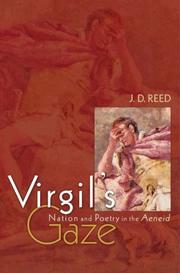| Listing 1 - 3 of 3 |
Sort by
|
Book
ISBN: 0472221426 Year: 2024 Publisher: Ann Arbor, Michigan : University of Michigan Press,
Abstract | Keywords | Export | Availability | Bookmark
 Loading...
Loading...Choose an application
- Reference Manager
- EndNote
- RefWorks (Direct export to RefWorks)
Constructing Communities in Vergil's Aeneid: Cultural Memory, Identity, and Ideology presents a new examination of memory, ethnic identity, and politics within the fictional world of this Roman epic, drawing previously unexplored connections between Vergil's characters, settings, and narrative and the political context of the early Roman Empire. This book investigates how the Aeneid's fictive ethnic communities--the Trojans, Carthaginians, Latins, and Arcadians who populate its poetic world--are shown to have identities, myths, and cultural memories of their own. And much like their real-life Roman counterparts, they engage in the politics of the past in such contexts as royal iconography, diplomacy, public displays, and incitements to war. Where previous studies of identity and memory in the Aeneid have focused on the poem's constructions of Roman identity, Constructing Communities turns the spotlight onto the characters themselves to show how the world inside the poem is replicating, as if in miniature, real forms of contemporary political and cultural discourse, reflecting an historical milieu where appeals to Roman identity were vigorously asserted in political rhetoric. The book applies this evidence to a broad literary analysis of the Aeneid, as well as a reevaluation of its engagement with Roman imperial ideology in the Age of Augustus.
Book
ISBN: 9782870312445 287031244X Year: 2007 Volume: 303 Publisher: Bruxelles: Latomus,
Abstract | Keywords | Export | Availability | Bookmark
 Loading...
Loading...Choose an application
- Reference Manager
- EndNote
- RefWorks (Direct export to RefWorks)
Group identity --- Ethnology --- Marginality, Social --- Identité collective --- Anthropologie sociale et culturelle --- Marginalité --- Rome --- Ethnic relations --- Relations interethniques --- National characteristics, Roman --- National characteristics, Roman, in literature --- National characteristics, Roman, in literature. --- National characteristics, Roman. --- Civilization. --- Civilization --- Greek influences. --- Historiography. --- Identité collective --- Marginalité --- Roman national characteristics --- Rim --- Roman Empire --- Roman Republic (510-30 B.C.) --- Romi (Empire) --- Byzantine Empire --- Rome (Italy) --- Greece --- Marginality [Social ]

ISBN: 9780691127408 0691127409 0691170916 9786612157905 1282157906 140082768X 9780691170916 9781400827688 9781282157903 Year: 2007 Publisher: Princeton : Princeton University Press,
Abstract | Keywords | Export | Availability | Bookmark
 Loading...
Loading...Choose an application
- Reference Manager
- EndNote
- RefWorks (Direct export to RefWorks)
Virgil's Aeneid invites its reader to identify with the Roman nation whose origins and destiny it celebrates. But, as J. D. Reed argues in Virgil's Gaze, the great Roman epic satisfies this identification only indirectly--if at all. In retelling the story of Aeneas' foundational journey from Troy to Italy, Virgil defines Roman national identity only provisionally, through oppositions to other ethnic identities--especially Trojan, Carthaginian, Italian, and Greek--oppositions that shift with the shifting perspective of the narrative. Roman identity emerges as multivalent and constantly changing rather than unitary and stable. The Roman self that the poem gives us is capacious--adaptable to a universal nationality, potentially an imperial force--but empty at its heart. However, the incongruities that produce this emptiness are also what make the Aeneid endlessly readable, since they forestall a single perspective and a single notion of the Roman. Focusing on questions of narratology, intertextuality, and ideology, Virgil's Gaze offers new readings of such major episodes as the fall of Troy, the pageant of heroes in the underworld, the death of Turnus, and the disconcertingly sensual descriptions of the slain Euryalus, Pallas, and Camilla. While advancing a highly original argument, Reed's wide-ranging study also serves as an ideal introduction to the poetics and principal themes of the Aeneid.
National characteristics, Roman, in literature. --- Romains dans la littérature --- Virgil. --- National characteristics, Roman, in literature --- Virgil --- Romains dans la littérature --- Nationalbewusstsein. --- Vergilius Maro, Publius, --- Vergilius Maro, Publius. --- Aeneis (Virgil). --- Virgil - Aeneis --- Virgile (0070-0019 av. J.-C. ) --- Virgile (0070-0019 av. J.-C.). Énéide --- Caractère national romain --- Thèmes, motifs --- Dans la littérature
| Listing 1 - 3 of 3 |
Sort by
|

 Search
Search Feedback
Feedback About UniCat
About UniCat  Help
Help News
News